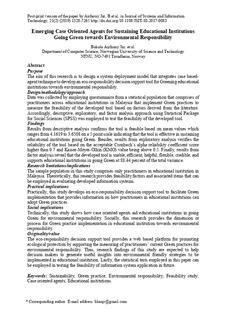Emerging case oriented agents for sustaining educational institutions going green towards environmental responsibility
Journal article, Peer reviewed
Accepted version

View/
Date
2019Metadata
Show full item recordCollections
Original version
Journal of Systems and Information Technology. 2019, 21 (2), 186-214. 10.1108/JSIT-10-2017-0083Abstract
Purpose
The purpose of this paper is to design a system deployment model that integrates case-based agent technique to develop an eco-responsibility decision support tool for greening educational institutions toward environmental responsibility.
Design/methodology/approach
Data were collected through questionnaires distributed among a statistical population that comprised practitioners across educational institutions in Malaysia that implement green practices. The questionnaire measured the feasibility of the developed tool based on factors derived from the literature. Accordingly, descriptive, exploratory and factor analysis approach using statistical package for social sciences (SPSS) was used to test the feasibility of the developed tool.
Findings
Results from descriptive analysis confirm the tool is feasible based on mean values that range from 4.1619 to 3.6508 on a five-point scale, indicating that the tool is effective in sustaining educational institutions going green. Besides, results from exploratory analysis verify the reliability of the tool based on the acceptable Cronbach’s alpha reliability coefficient score higher than 0.7 and Kaiser–Meyer–Olkin value being above 0.5. Finally, results from factor analysis reveal that the developed tool is usable, efficient, helpful, flexible and credible and supports educational institutions in going green at 88.44 per cent of the total variance, suggesting that the respondents are satisfied with the tool.
Research limitations/implications
The sample population in this study comprises only practitioners from educational institutions in Malaysia. Theoretically, this research provides feasibility factors and associated items that can be used in evaluating developed information systems.
Practical implications
Practically, this study develops an eco-responsibility decision support tool to facilitate green strategies and provides information on how practitioners in educational institutions can improve green growth.
Social implications
This study presents how case-oriented agents aid educational institutions in going green for environmental responsibility. Socially, this research provides the strategies for green practice improvement in educational institutions toward environmental responsibility.
Originality/value
The eco-responsibility decision support tool provides a Web-based platform for promoting ecological protection by supporting the measuring of practitioners’ current green practices for environmental responsibility. Thus, research findings from this study are expected to help decision-makers generate useful insights into environment-friendly strategies to be implemented in educational institutions. Lastly, the statistical tests adopted in this paper can be used to gauge the feasibility of information system application in future.